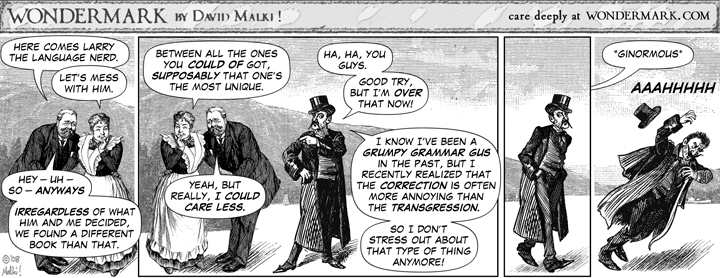Why my gut is language-prescriptivist

My family relentlessly mocks me for my language prescriptivism. I just posted this on our family Discord server:
I figured out the other day why I am more prescriptivist than descriptivist. I have spent my whole life learning to use language as a craft. A craftsperson is extremely careful with their tools. I had a graphic designer at the magazine back in the day who, if I touched his computer screen even glancingly with my finger while we were looking at a design, would actually hit me. The craftsperson cannot do their job without precision tools - the exact right tool for every job. If you have trained up with tools for years and decades, and suddenly everyone around you changes certain tools, it is deeply frustrating.
I don't say that is a knock-down argument for prescriptivism, but it is an emotive and practical argument. Also imperfect. More like people around you are misunderstanding the use of certain media that you rely on to communicate your art, and are insisting (because of that misunderstanding - and yes, it is almost always misunderstanding that causes language change) on using and interpreting that medium in ways contrary to, or at least different from, the meanings that have previously, publicly been attached to that medium. The goalposts are changed because of (frankly) sloppy thinking. And the descriptivists say "well, that's just what happens with language." Meanwhile, the meaning of some part of your old media/tools has simply been lost, or at best muddied.
It's an aesthetic, but even more a practical, problem. Since the writer's first imperatives are communicative clarity and power, and they have worked EXTREMELY HARD AND WITH GREAT LOVE AND ATTENTION on achieving that clarity and power, now that the "clarity and power rug" is being pulled out from under some part of the writer's tools/media owing to sloppy usage by people who have never invested time in communication and frankly don't care to do so, it angers the writer. Sorry, can't describe this in an emotionally neutral way.
I feel the same way as my old designer back in the day, who will have to see his next design through the smudgy fingerprints I've left on his screen—or will have to dedicate time and energy to cleaning the screen (for me, finding workarounds to people's sloppy usage).
So my oldest son responded to the above that he likes grades of uniqueness but "different than" annoys him slightly.
To which I replied that I've pretty much always taken the line that grades of uniqueness is like grades of virginity or pregnancy. Some categories really are just subject to a true-false test.
His response: Not any more. Unique just means interesting now.
And I asked, OK so what word can we use now that means unique? Or have we trashed that tool and not replaced it?
Because that’s a problem for me: we no longer have a word that means “comprise,” because “comprise” is now used sloppily. And of course there are many many more examples. The net result is loss of tools for clarity in communication. And as a writer, I am sad and frustrated about that. You can tell me “This word means such-and-such now.” Yes, it does. I’m not dumb. I don’t deny those changes. But I don’t have to be happy about them. Unfortunately, in so many cases we no longer have a word that means what “this word” used to mean. And that’s a net loss.


